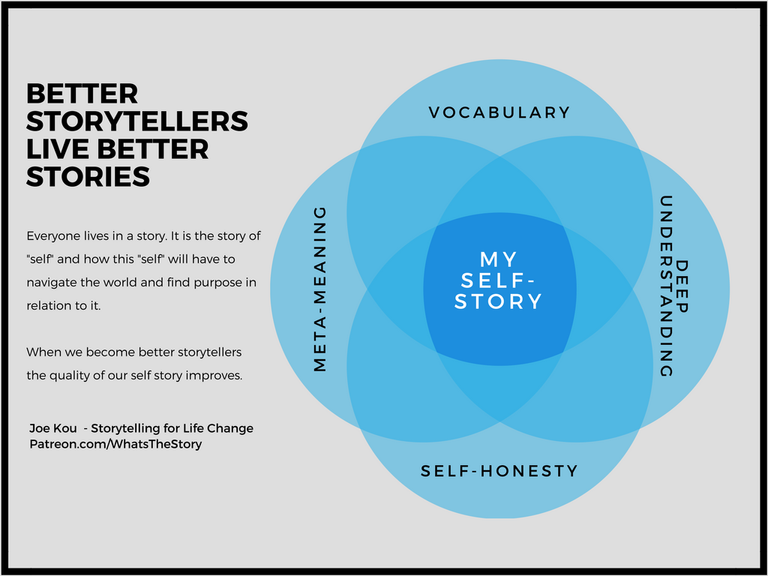
Development of vocabulary and having a deep understanding of not only the meaning of words, but understanding how to infer and interpret various meanings of words (meta-meanings) and how to effectively use them is an ability that is absolutely critical for everyone to develop no matter what age or what learning capacity - because these abilities have a direct impact on your quality of life and your ability to create your self-story in a way that empowers you rather than hinders you.
Let's take a look at some character archetypes :
- Underdeveloped Vocabulary and Life Creation -
When your grasp on vocabulary is less than optimal, your life choices become limited by your capacity to reason, understand, and literally create the "story" of your life. Events will happen to you and you will find yourself often unable to understand or articulate their meaning, purpose, or your responsibility within it and what strategies you can use to change and better yourself and your situation.
If a person has a low grasp on vocabulary AND tends toward being aggressive or egotistical, what you end up with is an individual that will find it difficult to restrain themselves and will tend to make decisions based on emotion, addiction, and often commits to poor life choices that repeat the same cycles over and over.
A person with an underdeveloped vocabulary but a deep understanding of words and their meta-meanings is still limited in terms of their utmost potential. Having a deep sense of understanding of limited words may cause them to over-rationalize, misconstrue, or misattribute the depth of meaning - which can produce a person who often feels disempowered and internalizes problems in a way in which they are always the victim or somehow at fault - and over time can become resentful or even righteous in their worldview.
- Underdeveloped Understanding and Life Creation -
A person with an average vocabulary but with underdeveloped ability to infer the deep and meta-meanings of words will tend to oversimplify and arrive at conclusions that they may feel they agree with, but will be unable to explain in detail or question critically. Such people will for instance read words such as "freedom, justice, democracy, and equality" and will immediately resonate with those words but will not be able to explain what those words mean in practical application, or in what context they should apply. This is because their understanding of those words is only at a surface level and is not yet deeply integrated into the levels of deep understanding and meta-meaning - and so will tend to only operate in "big picture" terms and not be able to describe the logic of their opinion, put up a reasonable argument for their perspective, or be able to hold a deep discussion about opposing points of view without feeling personally attacked or having to go into a mode of "debate" instead of inquiry.
But what about people with well developed vocabularies and poor grasp of deep understanding and meta-meanings? These are among the more dangerous I would say - because not only will their improved vocabulary give them a sense of self importance and superiority, they will tend to adamantly defend themselves using argumentation, logic, and reason - and often will be able to win any verbal debate using semantics. These individuals will believe they know more, and thus know better, and thus are "correct" but will find it difficult, if not impossible, to explain why they believe what they believe without having to refer to a text or a body of work that they have pulled their knowledge from. These individuals will seem resistant to suggestion and propaganda but are actually the most affected due to the blind spot of not being able to consider or even acknowledge the deeper meaning of words and ideas.
Don't take my word for it - have a look around at the people in your life and see if they have any of these characteristics - and then see if you can assess their vocabulary and deep meaning abilities. You will find that there is more than a slight correlation.
The ability to articulate your thoughts, beliefs, and experiences effectively, while also being literate of the deeper and inferred meanings of words and how they relate to your self-story drastically correlates to your approach to life. If you want to become a better storyteller, you need to understand these concepts first.
I am working on some course material to better describe and introduce the concepts of deeper meaning and meta-meaning in terms of words and how they relate to the stories we tell - either to ourselves, or to others. If you find my posts helpful and would like to contribute to my work, you can do so at my Patreon page - http://patreon.com/whatsthestory
In the meantime - I highly suggest checking out the work of Dr. Jordan B Peterson in regards to "Maps of Meaning - The Architecture of Belief". You can watch his full series of lectures free -
Dr. Jordan B Peterson - Maps of Meaning 2017 University of Toronto
Congratulation
Today one year ago you joined SteemItThank you, for making SteemIt great and Steem on for more years to come!
(You are being celebrated here)
Congratulations @joekou! You have completed some achievement on Steemit and have been rewarded with new badge(s) :
Click on any badge to view your own Board of Honor on SteemitBoard.
For more information about SteemitBoard, click here
If you no longer want to receive notifications, reply to this comment with the word
STOPCongratulations @joekou! You received a personal award!
You can view your badges on your Steem Board and compare to others on the Steem Ranking
Do not miss the last post from @steemitboard:
Vote for @Steemitboard as a witness to get one more award and increased upvotes!